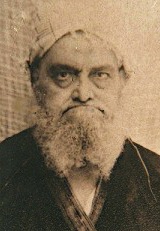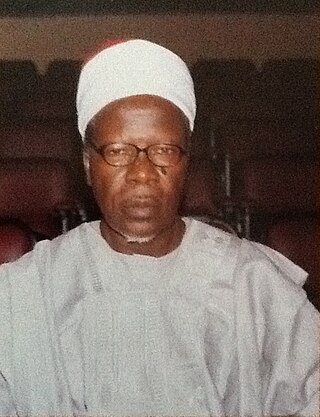
Sufism is a mystic body of religious practice found within Islam which is characterized by a focus on Islamic purification, spirituality, ritualism, asceticism, and esotericism.

Islam is one of the largest religions in Nigeria and the country has the largest Muslim population in Africa. In 2018, the CIA World Factbook estimated that 53.5% of Nigeria's population is Muslim. Islam is predominantly concentrated in the northern half of the country, with a significant Muslim minority existing in the southern region. Most of Northern Nigeria is governed under Sharia law, while the rest of the country is governed under secular law.

Sahih al-Bukhari is the first hadith collection of the Six Books of Sunni Islam. It was compiled by Persian scholar al-Bukhari around 846. The author was born in Bukhara in today's Uzbekistan.
Shams ad-Dīn Abū ʿAbd Allāh Muḥammad ibn Abī Bakr ibn Ayyūb az-Zurʿī d-Dimashqī l-Ḥanbalī , commonly known as Ibn Qayyim al-Jawziyya or Ibn al-Qayyim for short, or reverentially as Imam Ibn al-Qayyim in Sunni tradition, was an important medieval Islamic jurisconsult, theologian, and spiritual writer. Belonging to the Hanbali school of orthodox Sunni jurisprudence, of which he is regarded as "one of the most important thinkers," Ibn al-Qayyim was also the foremost disciple and student of Ibn Taymiyyah, with whom he was imprisoned in 1326 for dissenting against established tradition during Ibn Taymiyyah's famous incarceration in the Citadel of Damascus.

Zakariyya Kandhlawi was a mid-twentieth-century traditionalist Sunni scholar and an authority in the study of hadith, also known as Sheikh al-Hadith, hailing from India. He was an influential member and ideologist of Tablighi Jamaat and the author of the Fada'il series, which is a crucial propagation literature for the movement. Born into a family deeply rooted in Tablighi Jamaat and associated with the Deobandi movement, he studied under Mazahir Uloom and eventually became a teacher there in 1917, retiring over half a century later in 1968. Engaging with Sufism, a distinctive feature of the mainstream Indian Ulama, he was a student of Khalil Ahmad Saharanpuri in both hadith and spirituality. Together, they embarked on a ten-year journey to compile Badhl al-Majhud, an explanatory work on Sunan Abu Dawood. Initially published in five volumes, he expanded it to a twenty-volume collection. He made his first trip to Medina with Saharanpuri at a young age, and in 1972, he settled in Medina and continued his missionary work from there until his death. He was buried next to his teacher Saharanpuri at Al-Baqi Cemetery, whose successor he had been named. During his initial stay in Medina, he began working on a commentary on Muwatta Imam Malik, eventually publishing Awjaz al-Masalik over a thirty-year period. This work quickly earned him a reputation for his expertise in interpreting the Maliki tradition. The first edition, published in six volumes in India, was followed by a fifteen-volume second edition, with the first three volumes printed in Cairo and the remaining volumes in Beirut.
Abdullahi ɗan Fodio, was a prominent Islamic scholar, jurist, poet and theologian, and the first Amir of Gwandu and first Grand Vizier of Sokoto. His brother, Usman dan Fodio (1754–1817) was the founder of the Sokoto Caliphate. Usman, being more of a scholar than politician, delegated the practical regency of the western part of his empire to Abdullahi and the eastern part to his son Muhammed Bello, who later became the Sultan of Sokoto after his father.
Sheikh Uways Al-Barawi was a Somali scholar credited with reviving Islam in 19th century East Africa.
Wahbah Mustafa al-Zuhayli born in Dair Atiah, Syria was a Syrian professor and Islamic scholar specializing in Islamic law and legal philosophy. He was also a preacher at Badr Mosque in Dair Atiah. He was the author of scores of books on Islamic and secular law, many of which have been translated to English. He was chairman of Islamic jurisprudence in the College of Sharia at Damascus University, and a signatory to the Amman Message and A Common Word documents.
Kisi is a large town in Oyo State, Nigeria. It is the headquarters of the Irepo Local Government Area. Kishi, is located at the northern part of Oyo State. Kisi is very close to old Katunga which collapsed in the 18th century as a result of Jihad activity by the Hausa/Fulani of Ilorin, Kwara State. Kisi is reputed as a town whose people were never conquered or defeated in battles, hence many people from old Oyo migrated and settled in Kishi during and after the Fulani Jihadist invasion. Kisi is about 240 km from Ibadan, the capital city of Oyo state, and about 200 km and 110 km from Oyo Alaafin and Ilorin respectively.

'Ibrahīm Bin ʿAbd-El-ʿAzīz 'Abu al-Magd, better known as El Desouki (الدسوقي), was an Egyptian Imam and the founder of the Desouki Order.
Khatim al-Awliya' is a work by Al-Hakim_al-Tirmidhi. It was authored around 873. Ibn Arabi later expanded on the notion.

Zakariyau Idrees-Oboh Oseni, is a prominent Arabic and Islamic Studies Scholar, an Imam and a poet from Nigeria. He was trained at the University of Ibadan where he obtained a Certificate in Arabic & Islamic Studies (1971), B. A. First Class Hons. in Arabic Language and Literature (1977), M. A. in Arabic & Islamic Studies (1980) and PhD. in Arabic Language & Literature (1984). He has over 33 years' experience in lecturing in Arabic Studies and aspects of Islamic Studies. He has over 100 publications in Arabic, Islamic Studies and Literature out of which are three collections of poems in English, three plays and a collection of short stories in Arabic, and a collection of Afenmai Proverbs translated and annotated. He is an editorial consultant to fifteen academic journals in Nigeria and beyond. He was the Head of the multidisciplinary Department of Religions (1997–1999) and the Department of Arabic (2008–2009), University of Ilorin. Not only that, but he served as a Visiting Professor and Head, Department of Languages, Al-Hikmah University, Ilorin, from October 2011 to October 2012. He also served as the Dean, Faculty of Arts, University of Ilorin, Ilorin from 2009 to 2011. He is currently the Head of Department of Arabic, University of Ilorin. Furthermore, he is the Chief Imam and Waziri of Auchi. Moreover, he is a Fellow of Arabic Studies, Nigeria (FASN), Fellow of the Academy of Religion (FAR) and member of the Consultative Committee of 'Ulama' under the Nigerian Supreme Council for Islamic Affairs. He is happily married with children.

Sheikh Basheer Ahmed Muhuyiddin, Arabic: الشيخ بشير احمد محي الدين) is an Islamic scholar, preacher, and author. He was born in 1937 at his hometown of Paravanna in Malapuram district. He was the third son of the famous scholar and Muslim personality, Paravanna Muhyaddeen Musliyar. He pursued his primary education from Darul Uloom Vazhakkad and at Baqiyath Swalihath,vellur. He pursued his higher education by studying abroad and finished his post graduation at Al-Azhar University, Cairo and then at Illorin University, Nigeria. While working at Darul Ifta of Saudi Arabia, he was appointed as first official of its propagation center to African countries in Nigeria. A significant portion of his life and work was spent translating the Qur'an into three Nigerian languages, Hausa, Yoruba and Ibo, and the English translation “Quran: the Living Truth". Apart from these major contributions, Sheikh Basheer has written numerous Islamic books, notable among which is the Islamic Religious Knowledge series including Quran, Hadeeth, Fiqh and Islamic History. He died on 25 June 2005.

Safiur Rahman Mubarakpuri was an Indian Islamic scholar, teacher and writer within the Salafi creed. His book Ar-Raheeq Al-Makhtum, won a prize at the first Islamic conference on seerah Muslim World League in 1978.
Thaika Shuaib was a South Indian Islamic scholar, spiritual guide, and author. In May 1994, he became the first Tamil Muslim to receive the National Award for "Outstanding Arabic Scholar". He was mentioned as one of The 500 Most Influential Muslims in the 2013/14, 2014/15, 2016, 2017, 2018, 2019 and 2020 lists.
Ismail al-Khalidi al-Minangkabawi was an Islamic scholar who belonged to the Khalidiyya branch of the Naqshbandi tariqa in the 18th to 19th century. He hailed from today's Tanah Datar Regency, West Sumatra. He is regarded as the pioneer of the tariqa in Minangkabau region, as well as the whole Indonesian archipelago. He was also known as a scholar of Islamic jurisprudence, kalam theology and tasawwuf.
Mufutau Oloyede Abdul-Rahmon is a Nigerian professor of Arabic and Islamic studies. He is from Ile-Ogbo, Aiyedire Local Government Area of Osun State, Nigeria.

Abd al-Rauf ibn Ali al-Fansuri al-Sinkili was a well-known Islamic scholar, spiritual leader of the Shattariyya tariqa and the mufti of Aceh Sultanate. He was the confidant of Sultana Safiyat al-Din. He was considered the first person to spread the Shattari Sufi order in Indonesia and Southeast Asia. Many of his students also became disseminators of Islam. He is commonly known as Shaikh Abd al-Rauf al-Sinkili, and also known posthumously in Aceh as Teungku Syiah Kuala, which translates to "Sheikh in the Estuary".
Razaq Deremi Abubakre is former vice-chancellor of Al-Hikmah University, Ilorin, Kwara State, Nigeria. He is former Vice-Chancellor and Federal Commissioner for the Public Complaints Commission between 2012 and 2018. He was also a former chairman, College of Education, Ila Orangun, Osun State and former Dean, Faculty of Arts, University of Ilorin. He did his PhD in Arabic literature at the School of Oriental and African Studies, the University of London from 1977 to 1980 on Commonwealth Scholarship and Fellowship Plan. He was National President of Muslim Students Society of Nigeria. He graduated with a first-class degree. He also served as professor of Arabic Language and Literature.
Nematullah Azami, also written as Nematullah Azmi and Ni'matullah Azami, is an Indian Islamic hadith scholar, a commentator on the Quran (mufassir), and a faqīh. He is the president of India's Islamic Fiqh Academy. He has also been serving as a senior lecturer at Darul Uloom Deoband for forty years.






